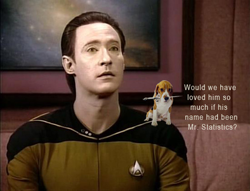![]() By Roy H. Williams
By Roy H. Williams
Today we call it Data but we used to call it Statistics.
 Statistics are boring. That’s why a clever boy in Silicon Valley gave them a new and better name.
Statistics are boring. That’s why a clever boy in Silicon Valley gave them a new and better name.
A scientist is willing to change a belief when presented with data, facts and logic.
But very few customers are scientists. This is why you must accommodate their perspectives, reinforce their biases, anticipate their preferences and leverage their stereotypes.
In his book, How to Win Friends and Influence People, Dale Carnegie said, “A man convinced against his will is of the same opinion still.”
Carnegie was quoting Benjamin Franklin who said it 100 years earlier.
Franklin discovered the idea in a satirical poem, Hudibras, written by Samuel Butler 100 years before that, in 1664.
That statement, “A man convinced against his will is of the same opinion still,” resonated with Carnegie, Franklin and Butler, just as it does with every person who has vainly attempted to use facts and logic to overcome a belief.
In the words of Andrew Lang, we generally use statistics “as a drunken man uses a lamppost, for support rather than for illumination.”
This is because data, facts and logic are not the keys to the mind.
The keys to the mind are metaphors, connecting the unfamiliar to the familiar, the unknown to the known. Metaphors employ Symbolic thought, the only type of thought that bridges the unconscious to the conscious, the right brain to the left, the category to the specific, the pattern to the purpose.
Verbal thought is the sound of words in your mind.
Analytical thought embraces data, facts and logic.
Abstract thought embraces patterns of events and patterns of answers. It’s a nonverbal, subjective reality built on preferences, prejudices and stereotypes.
Symbolic thought is a bridge that begins in the land of Abstract thought and ends in the land of Analytical thought. Parables, music and metaphors are powerful expressions of Symbolic thought. Each is more persuasive than Data.
You’ve heard it said that, “Every person is entitled to their own opinion, but not their own facts.” Yet we routinely craft our own facts from the fabric of personal experiences, preferences and prejudices.
A stereotype is nothing more than a pattern we’ve observed. This pattern isn’t always predictive, but it is a pattern nonetheless and we trust it. We do this in the misbegotten belief that we have correctly interpreted our past experiences and that our preferences and prejudices are, in fact, correct and reliable interpretations of objective reality.
We’re a funny, funny species, aren’t we?
We’re coaching a basketball game.
Cedric makes 4 baskets in less than 2 minutes so we conclude that Cedric has “a hot hand,” he’s “in the zone and has a feel for the basket,” so we instruct the other players to feed Cedric the ball.
Does it surprise you to learn that all the data clearly indicates that a player who makes 4 consecutive baskets in less than 2 minutes of game time is no more likely to make his next shot than usual? But every coach, every player and every fan of the sport will continue to feed Cedric the ball.
We don’t trust data nearly so much as we trust our heart.
Digital marketing is here to stay and it provides us with data beyond imagination. But data doesn’t change the mind. At best, it reinforces a decision that was already made in the heart.
Win the heart and the mind will follow. Don’t fill your messages with data. Instead, use metaphors that connect your idea to your customer’s world. Because a man convinced against his will is of the same opinion still.
Some things are slow to change. Some things never do.
Roy H. Williams
♦
